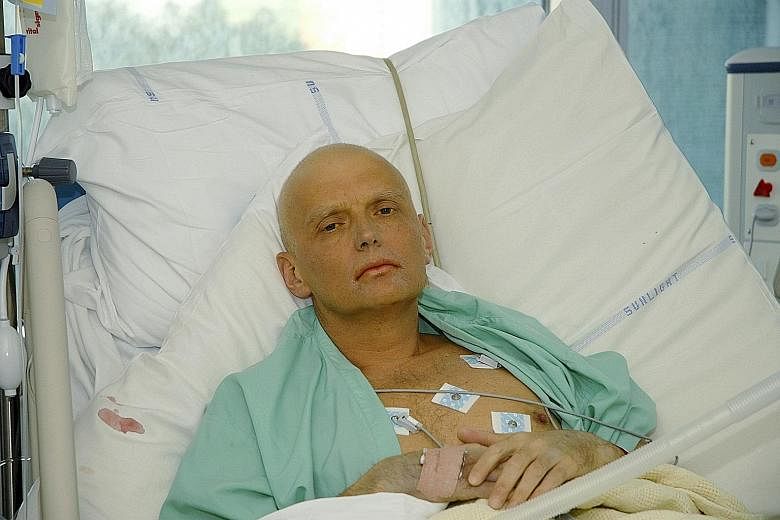LONDON • Russian President Vladimir Putin "probably approved" the killing of former spy Alexander Litvinenko in London, a British inquiry into his agonising death by radiation poisoning has found.
Mr Litvinenko, 43, a prominent Kremlin critic, died three weeks after drinking tea laced with radioactive polonium-210 - an extremely expensive radioactive isotope available only in closed nuclear facilities - at an upmarket London hotel in 2006.
Two Russians, Mr Andrei Lugovoi and Mr Dmitri Kovtun, were identified by British police as prime suspects but attempts to extradite the pair have failed.
The findings of yesterday's 300- page report pile pressure on Britain to act against Russia in response.
"The FSB operation to kill Litvinenko was probably approved by Mr (Nikolai) Patrushev and also by President Putin," the report said.
Mr Patrushev is a former director of the FSB, the successor organisation to the Soviet-era KGB spy agency, and has been a key security minister since 2008.
"I am sure that Mr Lugovoi and Mr Kovtun placed the polonium-210 in the teapot at the Pine Bar on Nov 1, 2006," judge Robert Owen, the inquiry's chairman, said in the report.
Russia dismissed the findings, calling the inquiry "politically motivated". "We had no reason to expect that the final findings of the politically motivated and extremely non-transparent process... would suddenly become objective and unbiased," Foreign Ministry spokesman Maria Zakharova said.
Mr Litvinenko's widow Marina, who spent years pushing for a public inquiry to be held, urged Britain to impose sanctions against Russia and a travel ban on Mr Putin.
"I'm very pleased that the words my husband spoke on his deathbed, when he accused Mr Putin of his murder, have been proved true in an English court," she told reporters.
Mr Litvinenko, a former KGB agent turned freelance investigator who also worked for British intelligence, accused Mr Putin of ordering his killing in a statement before he died in agony three weeks later on Nov 23, 2006.
The former spy's killing caused public outrage in Britain after radioactive traces were found at various sites around London. It was dubbed by the media as the world's first act of "nuclear terrorism".
Mr Litvinenko had fled Russia in 2000 and was granted asylum in Britain, later becoming a British citizen and converting to Islam. He was buried in a London cemetery with Muslim rites in a lead-lined coffin to prevent radiation leakage.
Home Secretary Theresa May said the government would summon Russia's ambassador to London to express its displeasure at Moscow's failure to cooperate with the investigation into Mr Litvinenko's death.
She also told Parliament that asset freezes relating to the case would be put in place .
AGENCE FRANCE-PRESSE, REUTERS

